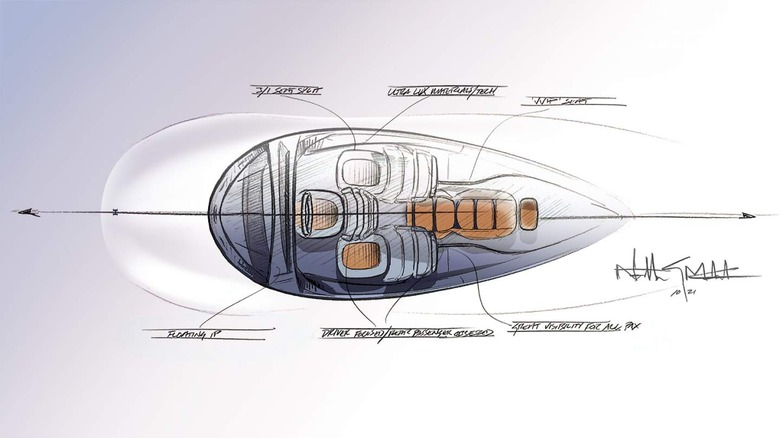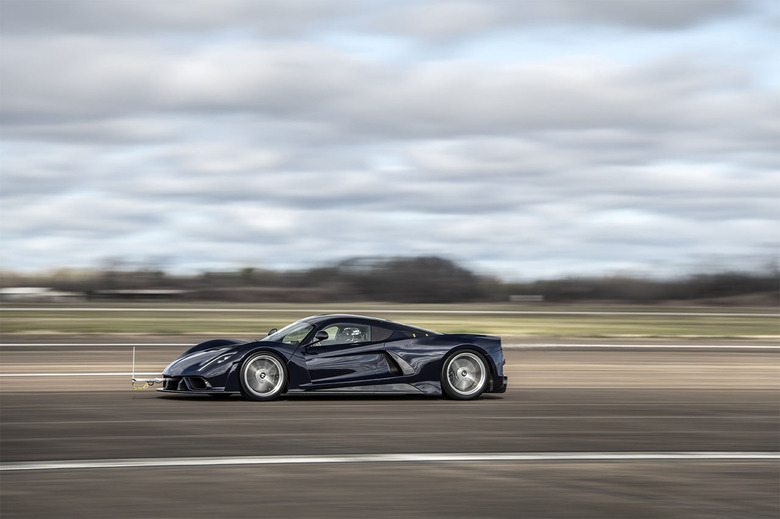Hennessey's Wild 6-Wheel EV Makes A Cybertruck Look Normal
Six wheels, six electric motors, and a cabin inspired by private jets as you do 200 mph or more: nobody could accuse automaker Hennessey of being unimaginative when it comes to their Project Deep Space hypercar. The company perhaps best known for making even more potent versions of performance trucks, not to mention the Venom F5, is promising even wilder things with a four-seater all-electric road rocket.
Hennessey Project Deep Space will look more like something out of Thunderbirds than a traditional luxury sedan. The company has only shared a few design sketches, but it's enough to make entirely clear that it could be even more shocking than a Tesla Cybertruck.
"If four electric motors are good, then maybe six electric motors are better," company founder John Hennessey explains. Each wheel will have its own, helping with driving dynamics for a sedan that's a whopping 20 feet long. More rubber in contact with the road, meanwhile, means far more grip.
The result, the automaker promises, will be the potential for "the world's quickest accelerating four-seater from zero to 200 mph." Exact performance figures, details on power and torque, as well as battery size have not been disclosed yet.
What we do know is that the chassis and body panels will use carbon fiber, for its light weight and structural strength. It'll also permit for vast gullwing doors – billed as the world's widest opening car door by Hennessey – giving access to a cabin unlike any other on the market.

Inside, the seating is laid out in a diamond pattern. There are four seats, yes, but not in the 2+2 configuration you might expect. The driver's seat is centrally positioned – Hennessey says he was thinking of the classic McLaren F1 there – while behind and to either side are two more chairs. However, the most luxurious spot is even further back.
There, a full-length recliner takes advantage of Project Deep Space's length, giving whoever is lucky enough to grab that space more than enough room to stretch out. Described as a "zero gravity" seat for extra comfort, it'll be capable of a fully lie-flat configuration.
The result is a car that promises space for not only four adults but four golf bags, and luggage. The goal, Hennessey says, isn't to compete with the outright sports performance of the Venom F5 with its 1,817 horsepower. Instead, it's to help enlarge the automaker's range with something focused on grand touring.
Just 105 of the cars are expected to be built, a process which Hennessey – somewhat ambitiously – says should start in 2026. Each will cost from $3 million, making them the most expensive electric cars so far.

Outright electric luxury isn't an entirely new category, though making the math balance can be tricky. Aston Martin initially aimed to reboot the Lagonda nameplate for an all-electric luxury series, going so far as to reveal a number of sedan and SUV concept cars. The project was shelved, however, as the British automaker struggled to keep afloat.
At the same time, Bentley and Rolls-Royce – brands with far more established heritage in luxury driving – have also signaled their intent to wade into all-electric motoring. Rolls-Royce will begin that process in a few years time, with the Spectre all-electric coupe. Bentley, meanwhile, aims to have its first pure EV arrive in 2025. Both companies see fully-electric being the only option around the end of the decade.
With the exceedingly short number of Project Deep Space that Hennessey intends to build, however, it'll leave even Rolls-Royce and Bentley's EVs looking fairly commonplace. That is, assuming the striking six-wheeler does in fact make it to public roads.
